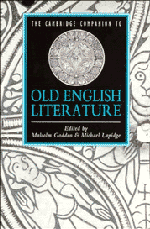Book contents
- Frontmatter
- 1 Anglo-Saxon society and its literature
- 2 The Old English language
- 3 The nature of Old English verse
- 4 The nature of Old English prose
- 5 Germanic legend in Old English literature
- 6 Heroic values and Christian ethics
- 7 Pagan survivals and popular belief
- 8 Beowulf
- 9 Fatalism and the millennium
- 10 Perceptions of transience
- 11 Perceptions of eternity
- 12 Biblical literature
- 13 Biblical literature
- 14 The saintly life in Anglo-Saxon England
- 15 The world of Anglo-Saxon learning
- Further reading
- Index
- Series List
9 - Fatalism and the millennium
Published online by Cambridge University Press: 28 May 2006
- Frontmatter
- 1 Anglo-Saxon society and its literature
- 2 The Old English language
- 3 The nature of Old English verse
- 4 The nature of Old English prose
- 5 Germanic legend in Old English literature
- 6 Heroic values and Christian ethics
- 7 Pagan survivals and popular belief
- 8 Beowulf
- 9 Fatalism and the millennium
- 10 Perceptions of transience
- 11 Perceptions of eternity
- 12 Biblical literature
- 13 Biblical literature
- 14 The saintly life in Anglo-Saxon England
- 15 The world of Anglo-Saxon learning
- Further reading
- Index
- Series List
Summary
Among the major concerns of the Anglo-Saxons, as the surviving Old English prose and poetry attest, were the questions of fate and free will, providence and individual responsibility. In the nineteenth and early twentieth centuries, a great deal of scholarly attention was given to a search for a common philosophical background for Germanic literature (distinct from the Latin learned tradition) to complement the readily identifiable shared elements in diction, style and verse form among Old English, Old Norse, Old Saxon and Old High German. One school of thought, once espoused widely and not without adherents today, holds that the belief in fate was a key feature of paganism, and that the degree to which humankind is seen to be controlled by fate in Old English literature shows the extent to which the inherent paganism of the text comes through untarnished or unalloyed. When fate is in competition with God, the text has been 'contaminated', usually by a 'pious interpolator', whose 'spurious' additions obscured the underlying Germanic heroic fatalism (never clearly defined or exemplified in any extant text).
- Type
- Chapter
- Information
- The Cambridge Companion to Old English Literature , pp. 160 - 171Publisher: Cambridge University PressPrint publication year: 1991
- 2
- Cited by

